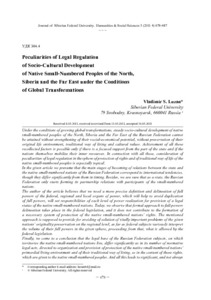Особенности правового регулирования социокультурного развития коренных малочисленных народов Севера, Сибири и Дальнего Востока в условиях глобальных трансформаций
Скачать файл:
URI (для ссылок/цитирований):
https://elib.sfu-kras.ru/handle/2311/2359Автор:
Лузан, В.С.
Luzan, Vladimir S.
Дата:
2011-05Аннотация:
Under the conditions of growing global transformations, steady socio-cultural development of native
small-numbered peoples of the North, Siberia and the Far East of the Russian Federation cannot
be attained without strengthening of their social-economical potential, without preservation of their
original life environment, traditional way of living and cultural values. Achievement of all these
recollected factors is possible only if there is a focused support from the part of the state and if the
nations themselves mobilize their inner resources. In connection with all these, consideration of
peculiarities of legal regulation in the sphere of protection of rights and of traditional way of life of the
native small-numbered peoples is especially topical.
In the given article we presume that the main stages of becoming of relations between the state and
the native small-numbered nations of the Russian Federation correspond to international tendencies,
though they differ significantly from them in timing. Besides, we are sure that as a state, the Russian
Federation only starts forming its partnership relations with participants of the small-numbered
nations.
The author of the article believes that we need a more precise definition and delineation of full
powers of the federal, regional and local organs of power, which will help to avoid duplication
of full powers, will set responsibilities of each level of power realization for provision of a legal
status of the native small-numbered nations. Today, we observe that formal approach to full powers
delineation takes place in the federal legislation, and it does not contribute to the formation of
a necessary system of protection of the native small-numbered nations' rights. The mentioned
approach is supposed to provide for avoiding of solution of vitally important problems of the given
nations' originality preservation on the regional level, as far as federal subjects variously interpret
the volume of their full powers in the given sphere, proceeding from that, what is allowed by the
federal legislation.
Finally, we come to a conclusion that the legal base of the Russian Federation subjects, on which
territories the native small-numbered nations live, differ significantly as in its number of normative
legal acts, directed to organization and provision of protection of the native small-numbered nations'
primordial living environment and of their traditional way of living, so in the content of those rights,
which are given to the native small-numbered peoples. And all this leads to significant, and not always justified differences in establishment of the legal status of the native small-numbered peoples of the
North, Siberia and the Far East on the territory of the Russian Federation. Устойчивое социокультурное развитие коренных малочисленных народов Севера, Сибири и
Дальнего Востока Российской Федерации в условиях усиливающихся глобальных трансформаций
невозможно осуществить без укрепления их социально-экономического потенциала,
сохранения исконной среды обитания, традиционного образа жизни и культурных ценностей.
Достижение всех перечисленных факторов возможно только при наличии целевой поддержки
государства и мобилизации внутренних ресурсов самих народов. В связи с этим особенно
актуальным является рассмотрение особенностей правового регулирования в сфере защиты
прав и традиционного образа жизни коренных малочисленных народов.
В статье отмечается, что основные этапы становления взаимоотношений государства
с коренными малочисленными народами в Российской Федерации соответствуют
международным тенденциям, однако они существенно отличаются по временным
промежуткам. Кроме того констатируется, что Российская Федерация как государство
только сейчас начинает формировать партнерские отношения с представителями коренных
малочисленных народов.
По мнению автора статьи, требуется более четкое определение и разграничение полномочий
федеральных, региональных и местных органов власти, которое позволит избежать
дублирования полномочий, установит ответственность каждого уровня осуществления власти
за обеспечение правового статуса коренных малочисленных народов. Формальный подход к
разграничению полномочий, который имеет место сегодня в федеральном законодательстве в
указанной сфере, не способствует становлению необходимой системы защиты прав коренных
малочисленных народов. Отмечается, что этот подход позволяет уходить от решения
жизненно важных проблем сохранения самобытности данных народов на региональном уровне,
поскольку субъекты Федерации по-разному трактуют объем своих полномочий в указанной
сфере исходя из того, что это позволяет им федеральное законодательство.
В заключение делается вывод о том, что правовая база субъектов Российской Федерации,
на территориях которых проживают коренные малочисленные народы, существенно
различается как по количеству нормативных правовых актов, направленных на организацию
и обеспечение защиты исконной среды обитания и традиционного образа жизни коренных
малочисленных народов, так и по содержанию тех прав, которые предоставляются коренным
малочисленным народам. Это приводит к существенным, не всегда оправданным, различиям в
установлении правового статуса коренных малочисленных народов Севера, Сибири и Дальнего
Востока на территории Российской Федерации.

